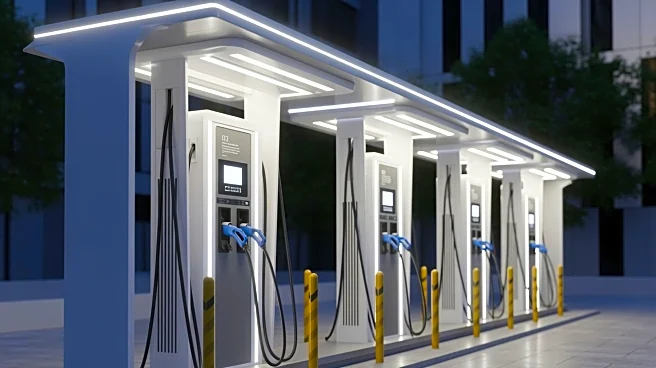What's Happening?
Battery prices are projected to drop by 70% over the next five years, according to industry insiders such as CATL, BYD, and Volkswagen Group. This significant reduction in battery costs is anticipated
to influence the retail prices set by car manufacturers, potentially making electric vehicles (EVs) more affordable. The decrease in battery prices could lead to a shift in market dynamics, with some carmakers opting to sell more vehicles at lower prices to gain market share. This trend is particularly relevant for companies that have committed to phasing out internal combustion engine vehicles by 2030, such as Volvo.
Why It's Important?
The anticipated drop in battery prices is crucial for the EV market as it could lower the cost barrier for consumers, making electric vehicles more accessible. This shift may accelerate the transition from internal combustion engine vehicles to electric ones, contributing to decarbonization efforts and reducing emissions. Additionally, the price reduction could stimulate competition among carmakers, potentially leading to innovation and improved battery technology. The broader impact on the automotive industry could include increased investment in EV infrastructure and a shift in consumer preferences towards more sustainable transportation options.
What's Next?
As battery prices continue to decline, car manufacturers may adjust their pricing strategies to capitalize on the opportunity to expand their market share. This could lead to increased production and availability of electric vehicles, further driving consumer adoption. Additionally, advancements in battery technology, such as increased density, may enhance the performance and range of EVs, addressing consumer concerns about charging and range anxiety. The industry may also see new entrants from countries like Vietnam, India, or Turkey, seeking to establish a presence in the lucrative European market.
Beyond the Headlines
The reduction in battery prices could have long-term implications for the automotive industry, including potential shifts in global manufacturing and supply chains. As electric vehicles become more affordable, there may be increased pressure on traditional carmakers to innovate and adapt to changing market demands. This transition could also influence public policy, with governments potentially incentivizing EV adoption through subsidies or infrastructure development. The environmental benefits of widespread EV adoption could contribute to global efforts to combat climate change.









